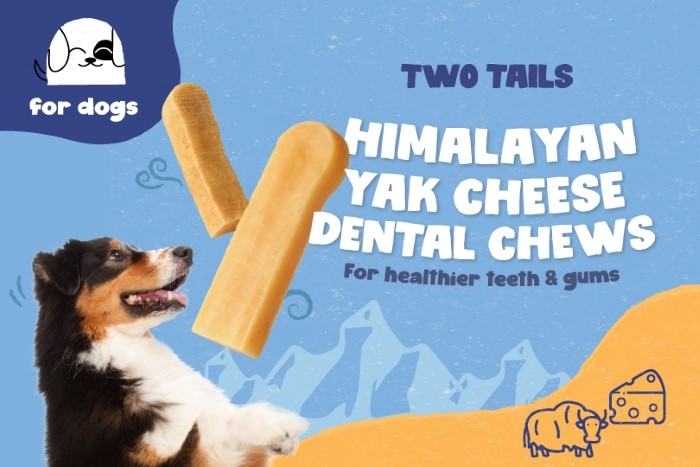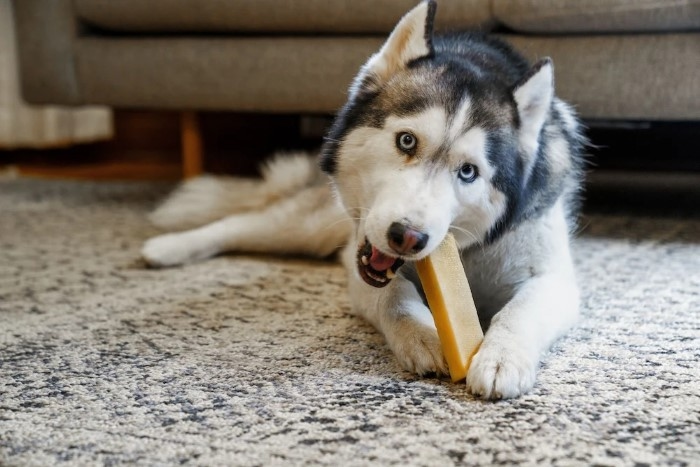Chewing comes naturally to dogs. Chewing engages them, relaxes them, and maintains their teeth clean. Dog owners always seek an eternal healthy chew which is healthy too. One of those which has also become popular lately is yak cheese chews. They are also known as “Himalayan dog chews” and are made from milk collected by yaks and cows found in the Himalayan heights of Nepal and Tibet.
But is yak cheese really healthy for canines? Is it healthy, safe, and worth the price? Let’s examine all of the things regarding yak cheese for canines that dog owners need to know, the benefits, disadvantages, and how to use it with your canine.
Table of Contents
What Is Yak Cheese for Dogs

Dogs’ yak cheese is a hard chew made up of milk, lime juice, and salt. Milk utilized is usually a mixture of boiled curdled yak milk and cow milk, which is molded into blocks and left to dry and ferment for weeks or months until they become extremely hard.
The cheese stick chew is a tough and durable product. Cheese, in contrast to yak cheese, contains very little lactose in it altogether, so dogs have no problem digesting it. They also come in a variety of shapes and sizes, so small dogs and large dogs alike can enjoy them.
They will be on sale at the stores under the title “Himalayan Dog Chews.”
Why Do Pet Owners Use Yak Cheese
There are a variety of reasons that yak cheese is the new dog owner’s best friend
It will last longer – dogs will consume one chew for hours or days.
It’s natural – usually consisting of just three ingredients, no flavorings or preservatives.
It won’t smell so bad – unlike rawhide or bones, yak cheese has no odor.
It is less messy – it won’t stain or leave a residue on the carpet.
It tastes and smells terrific – dogs love the cheesy taste and odor.
Because of these attributes, yak cheese is a cleaner and healthier alternative to rawhide, bones, or commercial chews.
Nutritional Make-Up of Yak Cheese
Yak cheese is more than just a chew toy. It is also a nutritious sort of way. On average, yak cheese contains
Protein: 60-65%
Fat: 4-6%
Carbohydrates: 10-12%
Calcium: rich source for healthy bones and teeth
Lactose: very low (usually less than 1%)
This renders yak cheese a low-fat, high-protein treat compared to the majority of dog treats. Protein helps develop muscles and mend them, and calcium helps aid oral and bone health.
Is Yak Cheese Safe for Dogs
Yes, yak cheese is safe for dogs in moderate amounts and under surveillance. Being very hard, the dog has to be persuaded to chew slowly. It’s a favorite among most dogs, and better than rawhide that will break apart and cause choking.
Safety, however, is subject to many variables
The proper size – select a chew of the right size for your dog. Too small, and swallowed whole. Too large, and too difficult to chew.
Supervise – be sure to supervise your dog when chewing to avoid choking or chipped teeth.
Moderation – yak cheese is very high in protein and calories. Too much can be taxing on digestion.
Used responsibly, yak cheese is one of the better chews on the market today.
Benefits of Yak Cheese for Dogs

These are the reasons that the pet owners provide for which they recommend yak cheese:
Increased playfulness – hogs them for hours, perfect for high-energy or anxious dogs.
Mouth and tooth hygiene – chewing dissolves plaque and tartar, healthy for gums and teeth.
High protein – creates toned muscles.
Low lactose content – perfect for dairy-allergic dogs.
All-natural and no preservatives – safer than most commercial treats.
Low odor and mess – perfect for indoor chewing.
To any dog owner, yak cheese is a two-fer: healthy for their pet and a clean house.
Risks of Yak Cheese to Dogs
Although yak cheese has so many positive things going for it, there are a few risks to consider.
Crunchy texture – though it makes it long-lasting, it actually poses the risk of breaking teeth if your pet chews vigorously.
Calories – yak cheese has high calories. If taken in excess by your dog, it leads to gaining weight.
Choking hazard – little pieces can chipped off while chewing and cause a choking hazard.
Digestive upset – not much lactose, but diarrhea or stomach disturbance for some dogs if taken in excess.
Cost – yak cheese is expensive compared to other dog treats.
All this in mind, moderation and observation are necessary when serving yak cheese to your dog.
How to Serve Yak Cheese Without Any Issues
For your dog to have yak cheese without any issues, use the following guide
Choose the correct size of chew for your dog type and weight.
Employ limited chewing time – begin with 15–20 minutes and observe digestion.
Choose small leftover pieces to avoid choking.
If the treat is too small, warm it up in the microwave for 30–60 seconds to make a puffed crunchy treat.
Offer fresh water along with the chew to make sure your dog stays well-hydrated.
With these simple steps, yak cheese can become a healthy and safe pet treat.
Homemade Alternatives to Yak Cheese

If you cannot afford or find yak cheese in your area, other chew alternatives that are healthy and can be used instead are as follows.
Carrots – crisp, low-calorie, and safe for the majority of dogs.
Sweet potato chews – healthy and can be made in your home.
Frozen banana slices – cold and sweet on hot days.
Bully sticks – another popular chew consisting of beef muscle.
Dental chews – are created expressly to remove plaque safely from teeth to chew.
Yak cheese is wonderful, but not the whole menu alone. Variety is what keeps your dog healthy and happy.
Interesting Fun Facts About Yak Cheese
Yak cheese is a regular staple food diet for Nepalese and Tibetans, who have eaten this for centuries.
The chews gained popularity in the United States around 2003 or so.
Other companies also produce puffed yak cheese snacks by heating small quantities of it using the microwave.
Yak cheese is also digestible, contrary to rawhide.
Other companies selling yak chews benefit Himalayan farmers since they buy milk directly from them.
These facts indeed verify that yak cheese is more than just a dog treat, but an ancient cultural food.
FAQs About Yak Cheese for Dogs
Is yak cheese safe for puppies?
It is appropriate for an adult dog. Puppies under 6 months have more sensitive teeth and will find yak cheese too hard.
Will yak cheese induce allergy?
Most dogs are okay, but if your dog has dairy allergy, best to avoid.
How long does a yak cheese chew last?
Depending on the size of the dog, it will last a few hours to a few days.
What do I do with small leftover pieces?
Heat for 45 seconds until they puff into a crunchy snack.
Is yak cheese safer than rawhide?
Yes. Yak cheese is completely digestible, while rawhide has the potential to cause blockage.
The best-selling dog chews available today contain yak cheese. This is exceptionally potent, natural, rich in protein and in amounts of calcium. Puppies devour it, and moms like the fact that it is neater and healthier than some of the other choices available.
It’s not great, but it’s very hard to break. It does need breaking, so under adult supervision to prevent choking or breaking teeth. It’s also quite calorie-dense, so portions do need controlling.
If you give it to them in moderation, yak cheese is a great treat for your dog. Mix it with good food, exercise, and approved vet attention, and your dog will not just enjoy chewing, but be happy and healthy.
So, is yak cheese good for dogs? Yes, if used responsibly. It is among the healthiest ways of keeping your pet engaged, happy, and full of cheesy nirvana.

